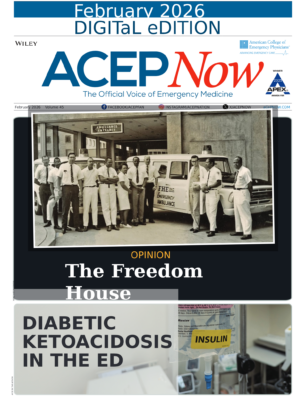
Firearm safety is a topic not only being discussed within ACEP but also of interest to other professional societies. At the most recent American College of Surgeons Committee on Trauma (ACS COT), a town hall was devoted to this topic, providing a lively open exchange among their members on the role they might play in promoting firearm safety and injury prevention.
Explore This Issue
ACEP Now: Vol 35 – No 07 – July 2016Advocating for a public health/trauma system approach to firearm injury prevention seems core to ACS COT’s mission. However, there were two contrasting, strongly held opinions among their members regarding gun ownership: Guns equal freedom and safety, or guns cause limitation of freedom and create violence. These two opinions are mirrored in society and also within ACEP. Many of us have heard this debate in our own Council several times. The ACS COT discussions took a different slant and approach. ACS COT leadership said that organizations want their decisions to be data-driven (and rightly so), but this is often derailed by emotions surrounding a particularly polarizing topic.
Rules of Civility
The goal of the town hall was to provide a forum for a civil, collegial, and professional dialogue toward developing consensus regarding interventions aimed at reducing firearm injuries and deaths. Setting the tone for the upcoming debate, Ronald Stewart, MD, chair of ACS COT, introduced the “conscious” leadership concept, where what a person perceives as facts are sometimes instead just “stories” without a true basis in demonstrable data.1
We as a society, and particularly as health care professionals, place a high premium on facts. However, those “facts” can actually be based on unintentionally made-up stories and be the cause of upset, drama, and distress around a difficult, polarizing topic. For example, a post on social media says that they’ve never seen so many people with guns in the city before. After several tellings to others, that post may unintentionally become the basis of a “study I read somewhere” about the rise of the number of guns in city centers.
Respecting others’ opinions simply requires us to recognize that they are entitled to look at the world differently and that when they share their views they can expect a fair hearing.
Once we understand that we all have a tendency to unintentionally make up stories and then come to believe these stories as actual facts, we can then choose to hold our story lightly, meaning that we acknowledge that the story is our story. It isn’t fact; it’s simply a reflection of the way we see the world.1 This opens an avenue to objectively listen to others, building a bridge between different beliefs and fostering dialogue that’s respectful.
Further setting expectations in advance of the ACS COT town hall, Dr. Stewart said that all discussions should be kept professional, civil, and respectful. He defined civility as respect for opposing views, particularly minority views, and tolerance for others’ opinions and stories. “There are at least two ways of showing disrespect for others based on what they think,” he said. “One is by telling them openly or intimating their opinions are crazy, stupid, or worthless. The other is by assuming what we think must be what others think also.” Respecting others’ opinions simply requires us to recognize that they are entitled to look at the world differently and that when they share their views they can expect a fair hearing.2
Positive Discussion
The town hall then started with a summary presentation of U.S. firearm injury data from the U.S. Centers for Disease Control and Prevention and the results of a poll of its membership on gun ownership. It turns out members were evenly divided, with roughly half being gun owners and half not wishing to own a gun or even favoring some form of gun control.
Despite members’ differences, discussion and debate centered around bridging the gap between beliefs and developing short- and long-term strategies to reduce firearm injuries and deaths without limiting the personal freedom of legitimate, responsible gun owners. Debate was both passionate and thoughtful, representing the full breadth of opinions, from gun ownership as a constitutional right representing freedom to guns being regulated and banned from general ownership.
Even with such polarity within the group, using the rule for civil discourse laid down at the beginning of the town hall as the basis for respectful discussions allowed members to achieve agreement on two principles:
- With freedom to own guns comes responsibility.
- Injury prevention programs should focus on responsible ownership and proper securing of guns to avoid misuse.
In addition, members agreed on the need to implement evidenced-based firearm violence prevention programs through their network of trauma centers. Concluding the town hall, organizers said that these goals resonated with ACS COT’s core mission and professional responsibility to advocate for public health and injury prevention as their members deal with firearm injuries on a daily basis. Work is now in progress on a model firearm safety injury prevention outreach program that can be adapted by individual trauma programs.
Dr. Perina is an ACEP Board of Directors member and an ACEP representative to ACS COT.
References
- Dethmer J, Chapman D, Klemp K. The 15 Commitments of Conscious Leadership: A New Paradigm for Sustainable Success. 1st ed. Chicago: Dethmer, Chapman & Klemp; 2015.
- Forni PM. Choosing Civility: The Twenty-five Rules of Considerate Conduct. Reprint ed. New York: St. Martin’s Griffin; 2010.
Pages: 1 2 3 | Multi-Page





No Responses to “American College of Surgeons Considers Promoting Firearm Safety, Injury Prevention”
July 27, 2016
Timothy Wheeler, MDWhere will training in firearm tactics, mechanics, and ethics fit into the surgical training curriculum? How will the ACS remedy the institutional poverty of knowledge in our profession about the civil right of firearm ownership?
Until now, organized medicine’s involvement in firearm policy has proceeded with deliberate, even defiant ignorance of these vital issues. The failure of their approach shows in the general lack of any results other than creating and nurturing ill will among America’s 100 million gun owners.
ACS leadership should proceed with this project with these caveats in mind. Or better yet, not proceed at all.
Timothy Wheeler, MD
Director
Doctors for Responsible Gun Ownership
A Project of the Second Amendment Foundation
drgo.us